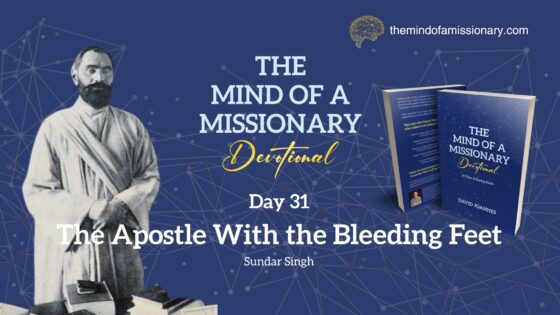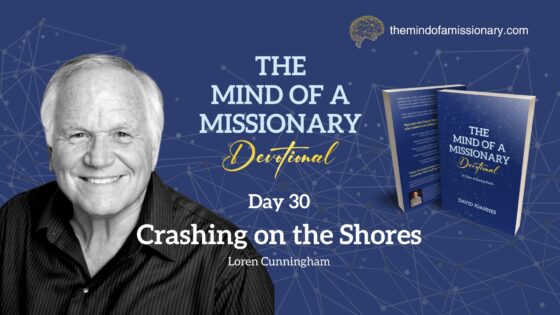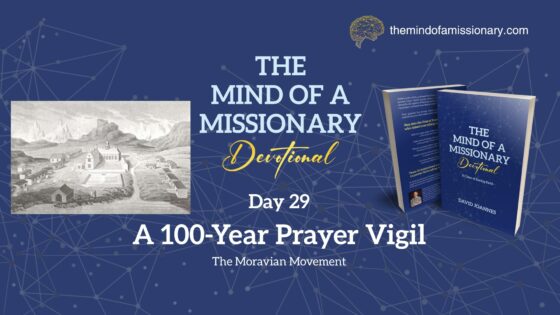Day 18
The Mind of a Missionary Devotional
A Hollow Among the Rocks
Ion Keith-Falconer
“Precious in the sight of the Lord is the death of His saints.” — Psalm 116:15
Dusk crept over Yemen’s southern port, the rocky cliffs forming elongated shadows. Squinting in the May twilight, Ion Keith-Falconer looked at the shoreline where the Red and Arabian Seas met. He grasped the wooden railings of his porch, tired and debilitated from his three-month battle with malaria, as wild monkeys swung in the palm trees nearby.
Since February, the fever had afflicted the British missionary and his wife on several occasions, with periods of respite in between. Ion had sent a comforting letter to his mother in Edinburgh, five thousand miles northwest, on May 1, 1887. “You need not have the slightest anxiety about us,” he stated. “At the present moment, we are distinctly better than we were after the first attack.” But things took a turn for the worst in the British-governed town of Aden not far from Mecca.
The missionary hobbled slowly along the verandah, returning to bed at a home that doubled as a medical clinic for Muslims. By ten o’clock at night on May 10, Ion was sound asleep. No one thought it would be the missionary’s final rest.
Ion Keith-Falconer was born into Scottish nobility in Edinburgh on July 5, 1856. As a young man, he excelled in athletics, becoming the president of the London Bicycle Club at age twenty and a British champion racer at twenty-two. At six feet three inches tall, Keith-Falconer was a man of physical prowess whose linguistic capabilities matched his athletic skills. At Cambridge University, he acquired Hebrew, Syriac, and Arabic; and in 1881, one year after graduating, he went to central Egypt to continue his Arabic studies. While on the banks of the Nile, God’s heart for the Islamic world settled deeply in his mind.
Keith-Falconer and his wife sailed for Aden on Yemen’s southern coast four years later. The Scotsman was shocked after witnessing the spiritual deprivation in Arabia. After a six-month exploratory journey, they settled on the location for a new medical mission and orphanage for Muslim communities. They returned to England in March 1886, pledging to go to Aden in the fall.
A few days before departing for Yemen, the fiery Scotsman urged fellow missionary recruits in Edinburgh and Glasgow to commit themselves unreservedly to lands where Christianity was a distant echo: “While vast continents are shrouded in almost utter darkness, and hundreds of millions suffer the horrors of heathenism or Islam, the burden of proof lies upon you to show that the circumstances in which God has placed you were meant by Him to keep you out of the foreign mission field.” Keith-Falconer was set on his course of action; thousands would follow in his daring footsteps.
The missionary couple returned to Aden for the long haul in November 1886. The immense physical and spiritual needs in the rugged southern Yemeni desert demanded their full attention. The missionaries went from house to house, caring for the sick, dispensing medicine, and sharing the Gospel with all who would listen. Locals gratefully paid for their medical treatment with wild honey, eggs, and tamed rabbits.
After three months of toil, Keith-Falconer faced his gravest battle when he fell into the relentless grip of malaria on February 22, 1887. “I never felt so utterly miserable in all my life,” he wrote, concerned about his mission slowing. “Our illness has thrown us back in every way,” he said. “I have been suffering from remitting fever for twelve weary weeks, laying on my back like a useless invalid.” The fever proved a fatal foe, weakening his once robust frame only six months after arriving on the mission field.
Early in the morning on May 11, 1887, Keith-Falconer’s life slowly ebbed away at the age of thirty, leaving behind a grieving wife and a mission in its infancy. However, the impact of his life defied the brevity of his years. Inspired by the Scotsman’s example, thirteen college students in England volunteered to go in his place; the response did not end there. Inspired by Keith-Falconer’s missional passion and dedication to the unreached world, several thousand young Americans and Canadians of the Student Volunteer Movement offered themselves to God as missionaries the same year.
On the evening of his death, he was buried in a cemetery near his dwelling—a lonely spot in a hollow among the rocks, within the sound of the waves of the Red and Arabian Seas. His mortal remains lay in a quiet grave, but his early death cast a ripple of missionary zeal that extended around the world for years to come.
– Personal Response –
Passage: Precious in the sight of the Lord is the death of His saints. (Psalm 116:15)
Point: Whether life be lengthy or brief, a heart fully surrendered to God bears long-lasting fruit.
Ponder: Are you living in such a way that your death, no matter when it comes, will echo with purpose throughout eternity?
Prayer: Lord, help me to see my life as Yours, whether long or short, and to live it boldly for Your glory. In Jesus’ name, amen
Proclamation: I will not waste my life on comfort or the fleeting things of this world. I choose the call of Christ, no matter the cost.
Practice: Write down one fear or excuse that keeps you from full surrender. Then pray over it, asking God to replace it with courage and obedience.
Learn more about The Mind of a Missionary Devotional at themindofamissionary.com




